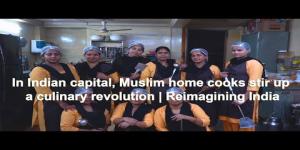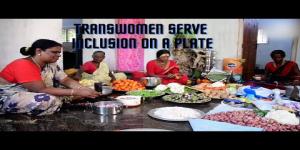In COVID times, individuals and groups lend helping hands to the needy
After COVID-19 pandemic hit India and followed by the strict lockdown, thousands of migrant workers began the arduous journey back to their villages hundreds of kilometers away, most of them on foot, along with their families, including young children

After COVID-19 pandemic hit India and followed by the strict lockdown, thousands of migrant workers began the arduous journey back to their villages hundreds of kilometers away, most of them on foot, along with their families, including young children. The sight of thousands of people walking on the highways – without food and shelter - moved many. A few tried to help out in whatever way they could but the majority sat in their homes deploring the plight of the migrants, while some remained unconcerned and even criticized them for breaking the lockdown, unmoved by their plight and misery.
While most people felt powerless due to the lockdown and the fear of the coronavirus, there were some brave hearts too. They did not let the circumstances stop them as they were determined to do what they can to help their fellow citizens.

Good Samaritans
One such Good Samaritan is Sanjay Suresh Diwe from Amravati in Maharastra, whose house is located near National Highway 6 which connects Surat to Kolkata and passes through almost the middle of India. Diwe saw the daily trudge and plight of the migrants who were walking back home through NH 6 in the hundreds. He was really pained to see their condition.
Diwe is the founder of the NGO Sanjwan Social Development Society (SSDS), which was founded in 2015 to help the marginalized communities.
Explaining how he began, Diwe said, “I was moved by the plight of the poor migrant workers. So I started with 10 meals which I distributed on the highway to the people walking to their homes. But I saw there were hundreds of people so the next day, I along with a few volunteers, set up a kitchen where we cooked and provided meals to people. We began with 30-40 cooked meal packets but it weren’t enough. We kept increasing. By mid-June, we were serving 1,000 meals a day, including lunch and dinner with the help of 25 volunteers. We also provided poha (flattened rice) and channa (chickpeas) for breakfast along with tea. During the hot summer, we gave them watermelon slices also. People would stop over to our stall on the highway from buses, autorickshaws, and tempos as also the many that were walking.”
Diwe said, “It’s God’s grace that we were able to provide food to thousands of people for so long. We began just three days after the lockdown and we are still continuing our work though now we are feeding the poor and people in need as the number of migrants walking to their homes have reduced to just a few. People from all communities helped us by providing us rice, vegetables, etc.”
Seeing the need, Diwe said, he plans to continue the kitchen and feeding the poor for as long as it is possible.
Another such Good Samaritan is Vaibhav Moon, based in Nagpur, Maharashtra. He is the founder of Uddhar, an NGO working in the Vidharbha region with farmers for the last ten years.
“In the five villages where we are working in Maharashtra, there have been no suicide since we began work. We are working in the Yawatmal District, and it is often recognized as the farmer suicide capital of India,” he said.
When the lockdown began people in the area started facing food shortages. Moon and his volunteers got into action. They were able to distribute 1,500 dry ration kits and hygiene kits to needy families, sex workers, and also transgenders. They worked in Nagpur with the support of the police in many places.

“We would station our team at the outskirts of the city to provide food to the migrants and to help them get transport so that they wouldn’t have to walk to their villages. We also set up a community kitchen at the Central Bus Stop for a month where we provided food, clothing, footwear, and hygiene and medical supplies to labourers.”
The community kitchen model was appreciated by the government officials and police for its participatory model involving all communities, businesses, religious groups and social strata of society, said Moon. The NGO with the help of other locals were able to serve daily 1,400 to 1,600 meals for breakfast, lunch, and dinner continuously with the help of 50 volunteers from different backgrounds.
Another group, which worked tirelessly, and is still active, is Youth With A Mission (YWAM) in Mumbai. They had distributed over 9,000 dry ration kits in Mumbai by May 20. Also, they have an ambulance service to ferry sick people to hospitals for free. They also ferried those people, who had no means during the lockdown, to railway stations. Now they are giving out immunity booster kits in 12 different locations in Mumbai. Their booster immunity kit comprises pepper soup, a boiled egg, a mask, sanitizer, and a pamphlet on COVID-19. They distributed hundreds of these kits from 12 different locations in Mumbai daily.
In June end they were also called by the Mumbai police to sanitise their bathrooms so they started the Police Station Bathroom Sanitisation Project.
Each day thousands of people are served by the YWAM team of dedicated volunteer, come rain or sunshine, said Marimuthu from YWAM.

Fundraising
There are also those who took on the task of providing funds for all these efforts and to alleviate the sufferings of the disadvantaged people. There are many people, who are not going out of their houses but have been instrumental in helping thousands just by donating money and also by raising funds through their friends and families. One such person is Joiel Akilan, a Mumbai-based banker, who is the country head of a European Bank, and paid for 1093 dry ration kits. He also raised money from his friends to provide dry rations kits for 726 others.
Speaking about his efforts to raise funds and also donating large sums to help migrant workers, Akilan said, “I am good at raising funds. My society was in the containment area so I was unable to move out but when I saw people on the streets in the news I was really moved. I knew I could help them so I started with my own money first, and then I also approached people I knew for donation. It’s very satisfying to see the smiles on the faces of those who were given ration kits..that is worth a million dollars.”

The only thing common about all these people – apart from their humanity and their zeal to help - is that they are all Christians. Before COVID-19, they didn’t even know about each other. They got to know each other through a WhatsApp group called Loving the Migrant Workers created by Rahul George, a businessman based in Bengaluru. He started the initiative and soon people living in different cities and towns came together for the common good. And many hundreds became part of the WhatsApp group, which is still active and continues to help out those in need. In Maharastra alone, they are working in Amravati, Akola, Mumbai, Ahmednagar, Ballarshaw, Bhusaval, Chandrapur, Jalgaon, Manmad, Nagpur, and Vasai to name a few cities. This is not an initiative backed by churches but by concerned citizens and groups. And they are all united for a common cause - to help the disadvantaged and the marginalised.
(The writer, an independent journalist and social activist, is the founder of Sabfree Foundation that provides an eco-system for survivors of child sexual abuse. The views expressed are personal. She can be contacted at sonalkellogg@gmail.com)
NOTE: If you want to extend a helping hand and be part of this initiative then contact: Sanjay Diwe (sanjudiwe@gmail.com), Vaibhav Moon- (vaibhav@udhhar.org) and Marimathu (muthuindia2000@hotmail.com)
























Post a Comment